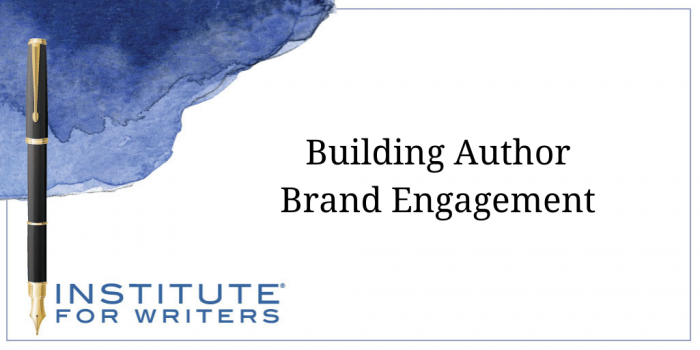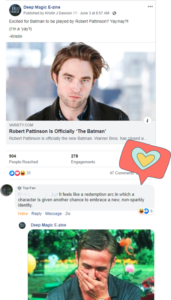1000 N. West Street #1200, Wilmington, DE 19801
© 2024 Direct Learning Systems, Inc. All rights reserved.

This is the last article in a four-part series on author platform. If you’re looking to build or strengthen a platform, you’ve come to the right place!
I’ve broken down essential portions of author platform into four easy-to-read articles:
1: Defining Your Author Brand – Part 1
2: Defining Your Author Brand – Part 2
3: Finding Your Target Market
4: Building Author Brand Engagement: It’s Not About the Numbers (Today’s article—see below)
This is the fourth article in the platform series: Building Author Brand Engagement
Whether you’re a musician, painter, or a mystery writer, your super fans (who–spoiler alert–are your favorite fans because they buy your stuff and refer you to their friends) want a direct, authentic relationship with you, the musician/artist/author.
Example of someone who rocks connection with their fans: Beyoncé. ‘Nuff said.
When you do a newsletter swap, other authors are going to want to know “your numbers.” They’ll say, I have 10,000 followers on my newsletter list (or I have 10,000 followers on Facebook). And they’re looking to swap with someone with about the same number of subscribers. But what you really want to know is:
– The open rate: Generally people don’t share that, or even know, but this is a much more accurate number.
– If their readers are primed to buy: Some authors have trained their audience to buy what they recommend–these authors might be micro-influencers. You will definitely want to do a swap with them, especially if they write in your same genre and have a similar style of writing (or similar branding!).
– Engaged audiences on other platforms: You’ll want to work with someone who has reactions, comments, and/or shares on their posts. (Hint–go look!)
It is not all about the numbers. It’s all about the engagement. Marketers used to only talk about the raw numbers. But that was tossed out years ago, however the literary industry hasn’t quite caught up with other small businesses in their mindset. So be a step ahead and look at engagement rather than the base followers.
There are a billion and one ways to engage with an audience. Here are some highlights:
• Share great content: Remember the first two articles on creating an author brand? Your final core branding and support branding will be the backbone of your posts. Regularly keep an eye out for photos, memes, quotes, and stories that fit within your branding that resonate with you (and your audience).
As an author, sharing content and creating stories is your jam. So think about each post as a mini-story. This concept of storytelling in media translates past social media to blog posts, contributor pieces on other websites, interviews, and beyond.
• Get the timing right: Look at your analytics and see when most of your audience is online. Post during your highest traffic times, but experiment with your posting to see when you get the best engagement rates.
Example: I had a client who had the greatest number of people online around 9am. But the engagement rates were much higher at noon. So at 9am, her fans were probably at work and were just scrolling. But during their lunch, they were able to interact with their friends online and were much more likely to leave comments.
• Consider automating: There are several automation tools for social media. There are many businesses that post every hour (or even more frequently). They have a social media manager who is scheduling these out days in advance, taking all sorts of metrics and goals into consideration. And you’ll also notice that most of these businesses have lower engagement rates, so automate with care. The automation tools often distance authors from their audience–it’s the difference between leaving someone a voice message and having a phone conversation. It’s huge.
Example of hybrid automation: Use tools to schedule out each week (or month). This enables the social media manager (often the author) to step back and make sure they have a good mix of content, going out at the best times of day. (Note: each platform will have different content, because audiences are on those platforms for different reasons and expect tweaked content for each.) But check your account regularly for comments. No dumping a pre-scheduled post and disappearing!
• Respond to posts: Why respond to comments in a timely manner? Think about it this way. Someone spent time typing–probably on a teeny tiny keyboard–to say hi. They deserve some sort of response. It’s like they want to give you a high-five and you leave them hanging!
Email example: A highly successful Wall Street Journal bestselling author I know personally responds to his fan emails. He’s not very interested in social media, but he spends several hours a week responding to email. He could hire out an assistant to do this for him, but he enjoys doing this himself.
• Be generous: Be thoughtful in your responses. If someone posts a deeply heartfelt comment, take a moment to recognize that they are seen. Or if there’s a super funny comment–try to come up with something funny in return. It’s insane how clever some people are and it comes through in their comments, like this one. I mean, seriously, who comes up with something that funny on the spot? (A storytelling writer, that’s who! I’ll bet you dollars to donuts this person writes.)


In the same vein of generosity, celebrate other authors. Your readers are reading more than just your books. If your author friend has a new book coming out, share it with your audience, too. Tell your audience a little bit about it and let them decide if they want to add it to their TBR list.
• Do promote your own books: Some industries only promote their own product. Annoying! All the thoughtful branding decisions you made (refer to the first two articles) should be front and center. But also rotate in book promotion. A general rule of thumb is to promote your books 20% of the time. I see authors doing it more on Instagram with success, but less frequently on Facebook. Test it out and see what works best for your readers.
• Consider author pods: Author pods are helpful for newer authors who are willing to work together to grow. Be warned that these can be time consuming and Instagram is cracking down on shady tactics. However, done ethically and with other quality accounts, these can still be worthwhile.
• Consider Facebook groups: Online closed Facebook groups are still going strong. These are a lot of work, but there are big pay-offs. Everyone in a group gets notifications for posts (until they turn them off), and posts in a group will be higher in a feed when someone scrolls, so they’re much more likely to see them. If you’re curating quality content, engaged, and have good moderators, these can be great places to engage with your fans––and your fans can talk to each other, too!
• Real People: Sometimes marketers get caught up in their marketing avatar or, again, only see numbers. But each fan is a human being with a real life: hopes, dreams, fears, loves, and losses. It serves an author well when they remember their readers are individuals.
Creating an author platform requires internal reflection, and then action. It’s a lot of work, but it is rewarding when you build real relationships with awesome people over time.
Kristin J. Dawson lives on the edge of a forest in the Pacific Northwest. She’s the author of THE LILAC PLAGUE, the HowDoesShe.com Literary Contributor, and a Deep Magic E-zine Board Member.
1000 N. West Street #1200, Wilmington, DE 19801
© 2024 Direct Learning Systems, Inc. All rights reserved.
1000 N. West Street #1200, Wilmington, DE 19801
© 2024 Direct Learning Systems, Inc. All rights reserved.
1000 N. West Street #1200, Wilmington, DE 19801
© 2024 Direct Learning Systems, Inc. All rights reserved.
2 Comments